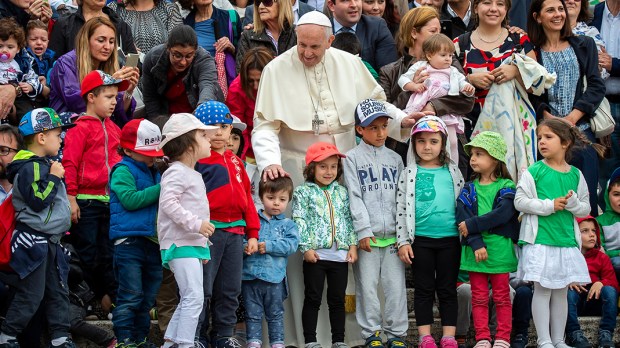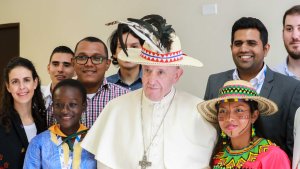In an audience with members of the World Union of Catholic Teachers (WUCT) on November 12, 2022, Pope Francis warned against “ideological colonization” and emphasized the importance of the Christian presence in education.
Adapting to the times … carefully
In order to be able to reach out to students, Pope Francis called on the teachers not to be “rigid,” as “rigidity destroys education,” but to be able to renew and adapt with each incoming group of pupils.
He thus explained that the WUCT, which was founded in 1908 to bring together Catholic teachers across the world, must help educators “find the most effective ways of transmitting the joy of learning and the desire for truth, by employing language and cultural forms suited to the young people of today.”
On this point, though, the Pontiff told the members of the association present to “beware of ideological colonization.”
“It is one thing to follow the culture of the moment, to speak the language of the moment, but it is another thing to allow yourself to be colonized ideologically. Please, be careful to form teachers in a way that enables them to discern a novelty that helps them to grow, and an ideology, an ideological colonization. Today, ideological colonization is destroying the human personality and it can be disastrous when it is applied in education.”
The Pope regularly uses this expression during speeches. For example, in September, during an audience with priests from the Secular Institute of the Schoenstatt Fathers, the Pontiff denounced the “stripping of human values” being “savagely carried out by ideological colonizations of all kinds.”
He highlighted that the nature of the family is “attacked by various ideologies, which shake the foundations that support the personality of the human being.”
What is ideological colonization, according to Pope Francis?
He often uses the term “ideological colonization” in reference to family ethics, marriage, and gender issues. And it often comes up in regard to poorer regions of the globe, and the influence wielded by rich countries in financial support.
See various examples, from 2015 and on, here.
Particularly regarding the school environment, in 2016, in a meeting with bishops of Poland, he said:
In Europe, America, Latin America, Africa, and in some countries of Asia, there are genuine forms of ideological colonization taking place. And one of these – I will call it clearly by its name – is [the ideology of] “gender.” Today children – children! – are taught in school that everyone can choose his or her sex. Why are they teaching this? Because the books are provided by the persons and institutions that give you money. These forms of ideological colonization are also supported by influential countries. And this terrible!
Christian teachers are “vitally important”
Pope Francis also emphasized the importance of WUTC’s mission. By encouraging and motivating teachers as “educators and witnesses of faith” they are almost like “co-workers of the pope,” he explained.
“In this way, you make present in the academic world the Church’s service of supporting Catholic teachers in the faith, so that they can carry out their work and bear witness in the best way possible, in situations that are often complex on the relational and institutional levels.”
The Pontiff stressed that the “presence of Christian educators in school communities is vitally important” and “Christian educators are called to be at once both fully human and fully Christian.”
“[Christian teachers] must not be spiritualistic, spacey and ‘other-worldly.’ They must be rooted in the present, in their own time and culture. It is important that on a personal level they be resourceful, open, and capable of establishing genuine relationships with students and understanding their deepest needs, questions, fears and dreams.”
Additionally, Chrisitan teachers need to be witnesses of faith.
“It is also important that they be capable of testifying – above all by their lives but also by their words – that the Christian faith embraces all of human experience, that it brings light and truth to every area of existence, without excluding anything, without clipping the wings of young people’s dreams, without impoverishing their aspirations.
“Indeed, in the tradition of the Church, the education of the young has always had as its goal not only the teaching of concepts but the integral formation of each human person in all his or her dimensions”



